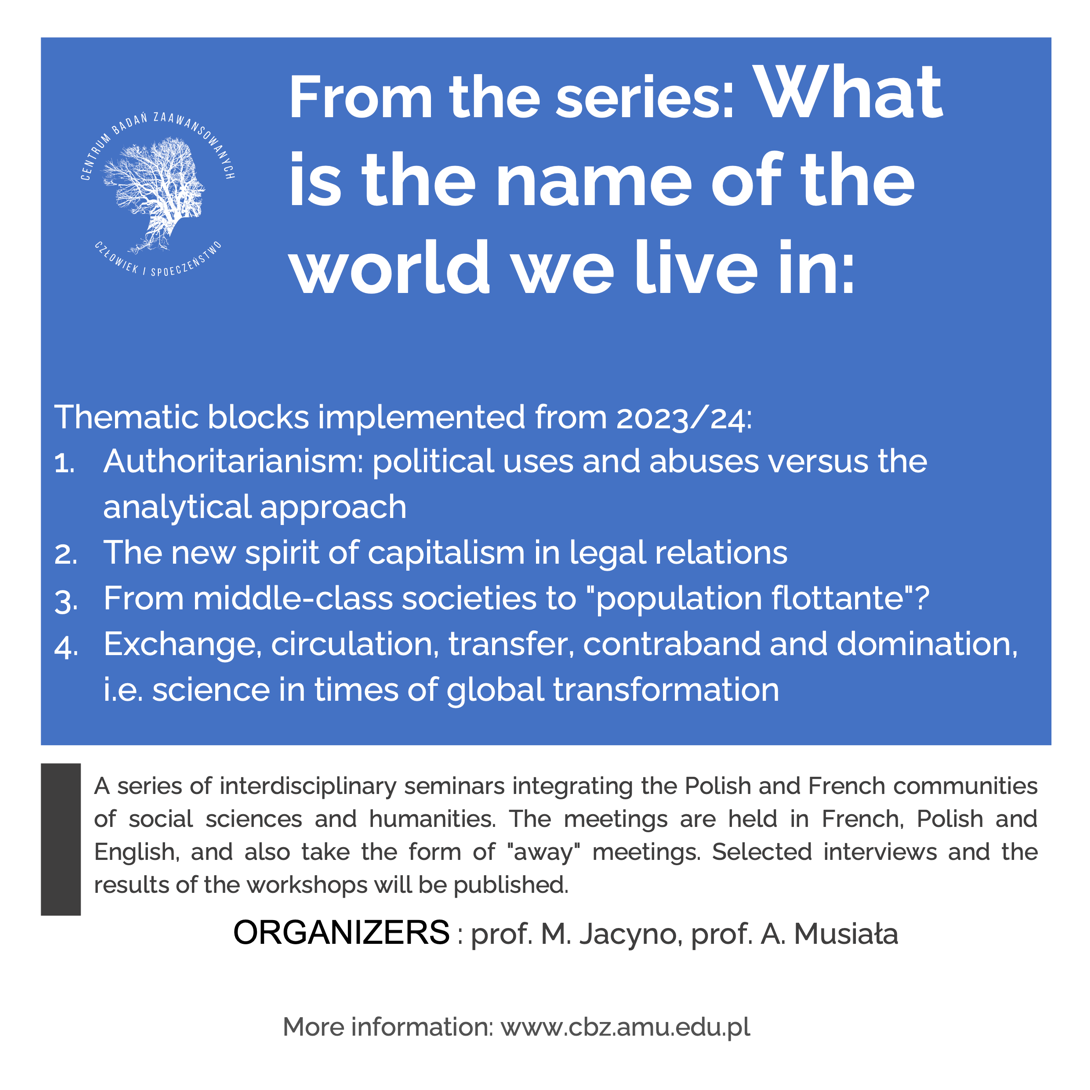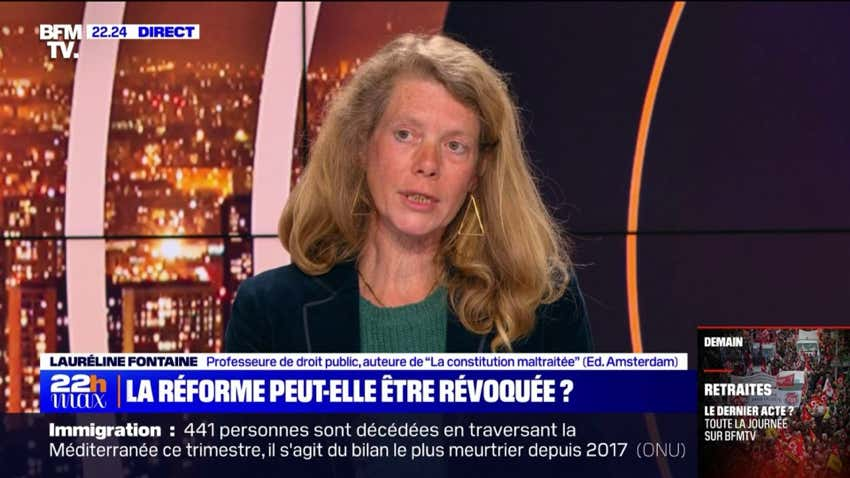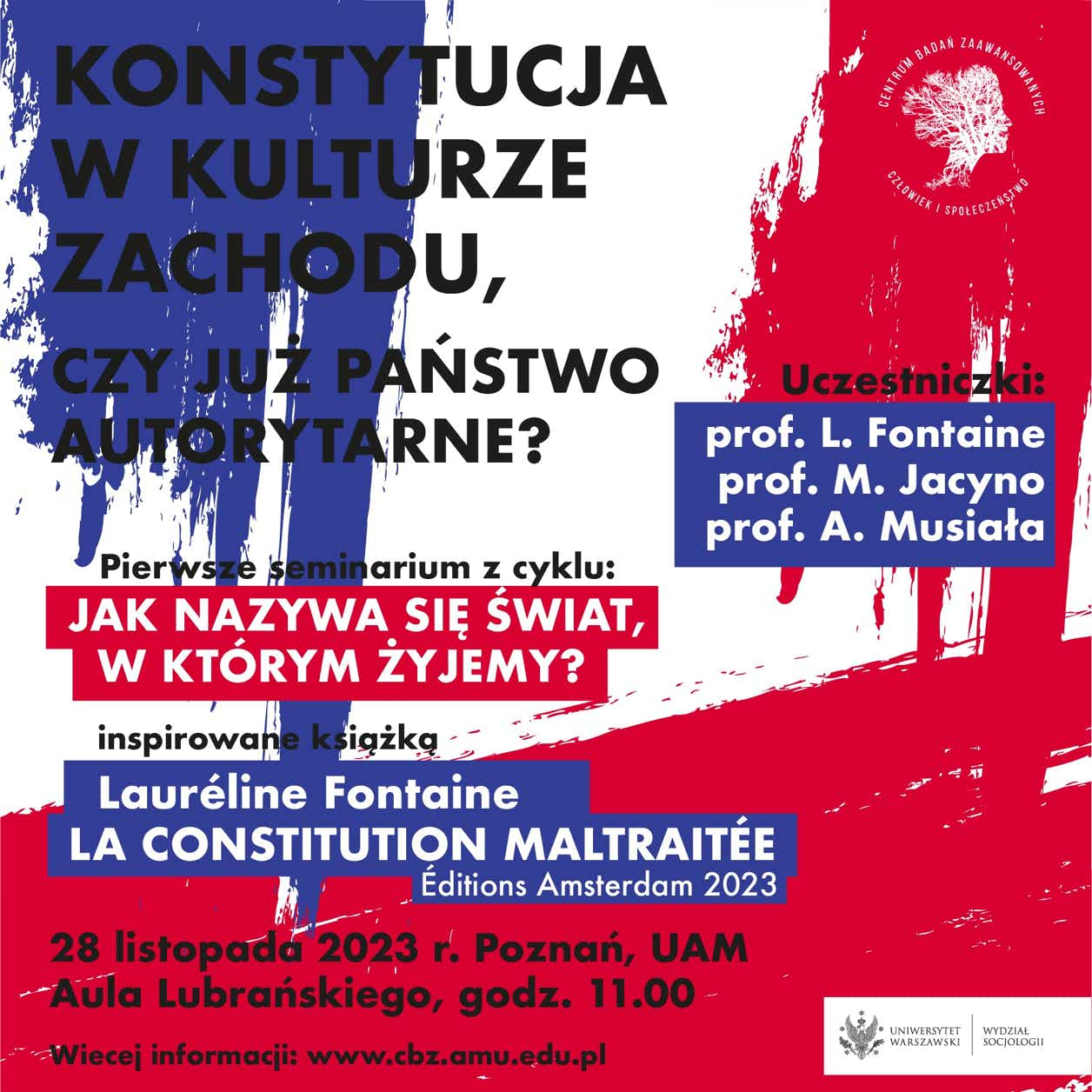-
INSTITUTE
-
EVENTS
-
ASSISES
-
SEMINARS

“Constitution in Western culture. Is it already an authoritarian state?”
- the first seminar in the series: "What is the name of the world we live in?",
inspired by the book by Lauréline Fontaine, "La Constitution maltraitée".
CBZ, November 28, 2023, Poznań, Aula Lubrańskiego,
Adam Mickiewicz University, at 11.00 A.M.

Lauréline FONTAINE is a lawyer and constitutionalist; researcher at the University of Paris 1 Panthéon-Sorbonne. Author of the book: "La Constitution maltraitée", with a foreword by prof. Alain Supiot; ed. 2023.
Wprowadzenie
A constitution "mistreated" by the judges of constitutional courts themselves ceases to be a social project, shifting liberal democracies towards authoritarian states. Lauréline Fontaine, a French constitutionalist, analyzing the legal condition of the Constitutional Council in France, looks at the requirements for legal judges, which are to guarantee a democratic state of law. Parallel to the questions formulated by Lauréline Fontaine regarding les sages de rue Montpensier (wise men - members of the French Constitutional Tribunal), one can ask about the level of independence, integrity and identity of Polish judges of the Constitutional Tribunal from the beginning of its existence and consider their contribution to achieving a balance between society and various groups and the implementation of the constitutional principle of justice, i.e. de facto in a large part of labor law. Does the problem of intellectual poverty of constitutional judges also affect Polish "wise men"? Can we really not say that the law they "enact" is a "reflection" of cheap justice (justice au rabais)? What is the degree of critical approach of Polish law, from which recruits are also recruited to constitutional courts?
During the first seminar in the series "What is the name of the world we live in", we will look for an answer to this question with Prof. Lauréline Fontaine, author of the book: “Konstytucja źle traktowana”, with an introduction by prof. Alain Supiot.
Resumé
Pilier de la Ve République, le texte constitutionnel n’en est pas moins maltraité en permanence – et ce, par l’organe même censé en être le garant.
Si l’on évoque souvent la désaffection des Français à l’égard du politique, ce constat n’aboutit que rarement à une critique exigeante des institutions qui alimentent cette dynamique. C’est ce avec quoi Lauréline Fontaine entend rompre, en jetant une lumière crue sur la réalité de la justice constitutionnelle sous la Ve République. Au terme d’une enquête approfondie, elle pose un diagnostic accablant : loin d’être une véritable cour constitutionnelle, le Conseil constitutionnel demeure une instance essentiellement politique. Il ne constitue pas un « contre-pouvoir essentiel », mais une anomalie démocratique.
Au fil d’une réflexion solidement argumentée tant en fait qu’en droit, Lauréline Fontaine défait un à un les mythes qui entourent « les sages de la rue de Montpensier ». Pointant notamment l’absence d’une procédure contradictoire et de garde-fous qui les préservent des conflits d’intérêt, elle démontre que la manière dont la justice constitutionnelle est rendue en France est absolument incompatible avec les principes élémentaires de la démocratie et de l’État de droit.

Thematic blocks implemented from 2023/24:
Thematic blocks implemented from 2023/24:
1. Authoritarianism: political uses and abuses versus the analytical approach:
The social world, as Pierre Bourdieu wrote, is a struggle and competition for defining and naming reality. During this block of meetings, we will consider what processes and phenomena are, according to contemporary researchers, considered symptomatic of the current system in which - as some researchers claim - war and peace are indistinguishable. During our seminars we will address the following questions:
• What is the essence of an authoritarian system?
• What transformations in the organization of a liberal democratic state indicate an emerging authoritarian state?
• What issues - legal or social - are considered decisive in the diagnosis of authoritarianism?
• How is authoritarianism understood in the legal culture of Western Europe and Eastern Europe?
• How does liberalism differ from neoliberalism?
• Why is the tradition of liberalism identified with neoliberalism in the Polish debate and what are the consequences of this?
2. The new spirit of capitalism in legal relations:
A block devoted to various forms of symbolic violence used in legal relations and their legal and ideological legitimization. In the 1950s, a discussion began in the West on the difference between the subjectivity of an employee and the subjectivity of a citizen. In this block we will deal with the following problems:
• Are you a citizen only after leaving work?
• Can an employee be "in the power" of the employer and what does this mean for all employment relations?
• In what historical conditions was the spirit of social rights developed?
• What does the spirit of the law say about the difference between symbolic violence and physical violence?
• How did employee management strategies change in private enterprises and public institutions in the 20th century?
• How capitalism penetrates and forms/deforms the legal foundations of the socio-economic order and how does it affect established social relationships, e.g. family?
3. From middle-class societies to "population flottante”?
Europe's global prestige was identified with prosperity for the majority, while the last decade was marked by the diagnosis of the disappearance of the middle class in the West. As some authors claim, the middle class has become an unnecessary element of the system, and global transformations require local adaptations. During the pandemic, the idea of universal basic income was popularized as a remedy for current and future crises. This block of seminars will be devoted to the following issues:
• Les passions tristes, or the politics of affects in times of crisis.
• The welfare state (État-providence, État social, welfare state) as a historical phenomenon.
• What is "welfare" and what obligations does this idea create towards the state and the parties to the employment relationship?
• What changes to the labor system and social order are implied by the universal basic income project?
• What is the sociogenesis of universal basic income?
• Why is the universal basic income project the subject of criticism in Western Europe, while in Eastern Europe it is considered a progressive demand?
4. Exchange, circulation, transfer, contraband and domination, i.e. science in times of global transformation
Many institutions declare their mission to popularize scientific knowledge, and in the public debate we often hear that knowledge is a common good. A shift has taken place in the study of knowledge production: analogies between academia and religion have now replaced analyzes that show scientific knowledge as part of an immaterial economy. Brand, rent from connections, influencers, narrative brokers, profitability, investments, entrepreneurship, profits, global and local systems of assigning value to creativity and control of the circulation of ideas are concepts through which we examine how knowledge is produced and capitalized. This block of meetings is devoted to the following questions:
• How did the idea of academic freedom develop?
• Who produces knowledge today, and who capitalizes it and how?
• How do the center elites (state, intellectual, financial) differ from the peripheral elites?
• What role do think tanks play in the circulation of ideas and topics of public debates?
• What does apoliticality mean in exercising state functions and creating political order in the state?